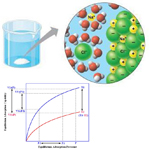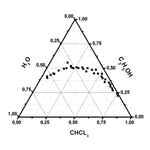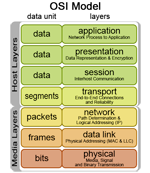| Current Lectures in Master Degree |
  |
Practical Chemistry
The seminars and tutorials are designed to confirm and extend students knowledge obtained in bachelor degree training on key areas of applied chemistry and physical chemistry as purification methods, chemical synthesis, qualitative, quantitative and phase analysis. Laboratory practical exercises allows students to put into practice their knowledge, to learn the rules and techniques of chemical experiments and acquire skills for independent laboratory and research work in various fields of application. The course is designed for students of the Faculty of Physics and is adapted to their needs in this area. During seminars and practical classes are conducted discussions aimed to clarify specific issues concerning the future work of young professionals and the need to acquire practical knowledge and skills to work in research laboratories. The final grade is formed after multimedia presentation and defense of course project. |
 |
Open source software with applications in the communications
The course aims to provide students with basic knowledge on the use and administration of operating systems based on Linux kernel. Formed practical skills and routines when working with computer hardware and Unix-Like operating systems, and also to work with command line interface. During that course the students study and compare different Linux distributions, they also acquire knowledge about operating system for mobile devices - Google Android. Students learn how to install and manage different software applications with open source. Particular attention is paid to server applications, their setup, administration and troubleshooting. Practice sessions are held with Linux-based hardware and / or virtual machines. The final grade is formed after multimedia presentation and defense of course project. |
 |
Computer practice in communication systems
The presented course systematizes the existing knowledge and creates new knowledge in computer networks and communications. It is designed to develop specific skills and abilities necessary for further professional career in working with local and global computer networks. Creates routine in informational resources and communication systems usage. The exercise structure follows 7-layers OSI model in parallel with TCP/IP. Special attention is given to acquiring practical experience for maintenance, configuration and administration of network devices and services in local and global computer networks. As a result of the following course, students will receive knowledge and develop skills for: Fundamental concepts and principles of telecommunications; computer networks; OSI and TCP/IP models; design and build of local networks; network devices; configuration and administration of end-user computer systems; network routing; maintain network services; analyze and estimation of optimal conditions; discover reasons for limited connectivity and finding effective solutions for. The final grade is formed after multimedia presentation and defense of course project. |
 |
Computer practice in communication networks and protocols
This practical course systematizes the existing knowledge and creates new knowledge in computer networks. The main goal is to set up good understanding in network protocols and their functions. It develops professional practical skills for maintaining and working with local and global computer networks. Build a routine in informational resources usage. The main structure of the lessons follows OSI and TCP/IP model. Particular attention is paid on developing practical abilities routine. Knowledge to configure and administrate basic types network devices. Studying fundamental network services in local and global networks. As a result students will acquire knowledge and skills for: basic principles in telecommunications and computer networks; meaning and functions of the network protocols follows OSI model; Protocol stack TCP/IP; network wiring using UTP cables; Design, build and administration of local computer networks; проектиране, network routing; estimation and configuring of network components and devices; supporting and administration of main services in local networks; end-user system administration; analysis and finding effective solutions for common network problems. The final grade is formed after multimedia presentation and defense of course project. |
| << BACK | |